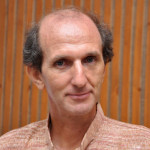 Born in France in 1956, Michel Danino has been living in India since 1977 and is an Indian citizen. An independent student of Indian civilization, he authored The Lost River: On the Trail of the Sarasvati (Penguin India, 2010), a multidisciplinary study of the Vedic Sarasvati river, and Indian Culture and India’s Future (DK Printworld, 2011). The Dawn of Indian Civilization and the Elusive Aryans is under preparation. With Prof. Kapil Kapoor he co-edited a two-volume textbook on “Knowledge Traditions and Practices of India” for a CBSE elective course for class XI and XII.
Born in France in 1956, Michel Danino has been living in India since 1977 and is an Indian citizen. An independent student of Indian civilization, he authored The Lost River: On the Trail of the Sarasvati (Penguin India, 2010), a multidisciplinary study of the Vedic Sarasvati river, and Indian Culture and India’s Future (DK Printworld, 2011). The Dawn of Indian Civilization and the Elusive Aryans is under preparation. With Prof. Kapil Kapoor he co-edited a two-volume textbook on “Knowledge Traditions and Practices of India” for a CBSE elective course for class XI and XII.
Michel Danino has lectured across India on many aspects of Indian civilization and culture. Twice a scholar-in-residence at IIT Kanpur (2011 and 2014), he was a visiting faculty at IIM Ranchi for three years, and since 2011 has been guest professor at IIT Gandhinagar, where he has assisted the setting up of an Archaeological Sciences Centre and given courses on ancient India’s civilization and culture. He is also a member of the Indian Council of Historical Research.
His other interests include nature conservation, a field in which he was especially active during his stay in the Nilgiris (1982–2003).
Abstract of the lecture
1. Did premodern India have a sense of history? A new take on an old question
A widespread scholarly and popular notion is that India has no sense of history. The usual argument goes that India it boasts very few historical writers and chronicles, no state-instituted historical or civic records, no travellers’ accounts to distant lands; her literary traditions play havoc with authors and dates, and Indians generally display a low level of historical awareness as well as concern for heritage conservation. After examining India’s concept of itihāsa as reflected in texts of historical tradition (such as the two Epics and the Puranas), this lecture will dwell on epigraphic sources, ballads as representative of folk history, and a few known and lesser-known chronicles of historical value, such as the vamshavali tradition. It will also offer a glimpse of communities involved in keeping family records, sometimes over centuries. The overall picture will be that of a different concept of history, oralized, regionalized, often hero-centred and semi-mythologized, but still very much alive in the collective consciousness.
2. Did “tribes” exist in early Indian society? Ancient concepts of “mainstream” and “marginal”
Although tribal communities have existed for millennia in India, the concept of tribe is, strictly speaking, a nineteenth-century creation of European ethnology. Ancient Indian literature is aware of forest-dwelling or mountain-dwelling communities, but did not generally regard them as “marginal”. Except with the most isolated among them, sociocultural and sometimes trade interactions with “mainstream” society were the rule; they resulted, for instance, in the two-way migration of gods and goddesses, in the sharing of eco-spiritual rituals and concepts, in the upward migration of tribal groups to kshatriyahood and even brahminhood, so that the boundary line between “mainstream” and “marginal” is, in the case of Indian tribal groups, blurred or nonexistent. At the heart of the marginal vs. mainstream issue is the decentralized, organic and assimilative nature of Hinduism, which will also be discussed.
3. Travellers to India: The French
Travellers to India at any epoch are always useful sources on Indian society, although their accounts need to be used with discernment. The French travellers, most of them from the seventeenth century onward, left testimonies often very different from those of other colonizing nations, with perhaps all the more empathy for India as France lost the political battle to Britain. Touching upon a few Jesuits and other early travellers, this lecture will focus on Tavernier, Anquetil-Duperron, Sonnerat, Le Gentil and Polier. Those extremely rich testimonies range from Indian society, customs, religions, literature and mythology to India’s industries, science and technologies. French travellers in effect laid the foundations for France’s nineteenth-century school of Indology, the main channel of Indian influence on French thought and literature.
Readings